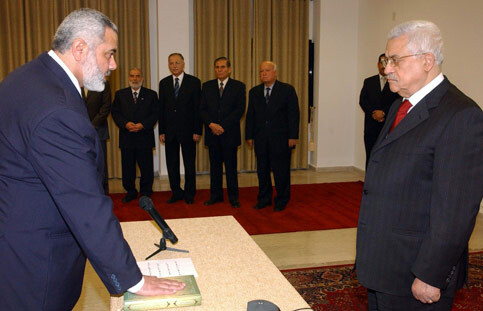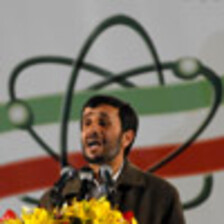The Electronic Intifada 21 March 2007

Ismail Haniyeh and the rest of the new Palestinian Unity Government being sworn in on 17 March 2007 in Gaza City. (MaanImages/POOL/PPO )
JERUSALEM, 21 March 2007 (IPS) - Palestinian leaders heaved a sigh of relief over the weekend when the formation of the long- awaited Hamas-Fatah national unity government finally became a reality. The unity coalition, they hope, will extinguish factional violence in the Gaza Strip that has claimed the lives of over 100 Palestinians in recent months.
But the Palestinians could quickly discover that while the formation of a unity government, after months of tortuous negotiations, may have averted the threat that growing internal strife would balloon into all-out civil war, it could fail to achieve its second and no less important goal — the lifting of crippling international sanctions.
When Prime Minister Ismail Haniyeh of Hamas presented the proposed list of ministers to President Mahmoud Abbas, who heads the more moderate Fatah faction, he provided sparse detail of the new government’s programme. All he would say was that a priority of the new government was ending “the security anarchy” in Gaza.
The unity government platform calls for preservation of the truce with Israel and includes a vague reference to honouring previously signed interim peace deals. But it fails to meet the three key demands set by the international community if the new government is to be recognised and sanctions lifted: there was no clear renunciation of violence, no clear pledge to adhere to existing agreements and no recognition of the state of Israel.
Predictably, the Israeli cabinet voted overwhelmingly Sunday 19-2 to continue its boycott of the Palestinian government.
“Israel expects the international community not to be misled by the formation of the Palestinian unity government, and to persist with its position of isolating the government that rejects the principles set out by the Quartet (the United States, Russia, the European Union and the United Nations),” said Prime Minister Ehud Olmert. Olmert has made it clear, though, that he will maintain contacts with Abbas.
The Palestinians might have been heartened by the announcement by U.S. and European Union leaders that they will conduct relations with non-Hamas members of the new unity government, and by Norway’s announcement that it was re-establishing full ties with the Palestinian Authority. But Norway is not a member of the EU and both U.S. and EU officials have made it clear they are not about to lift the economic embargo on the Palestinian Authority that has been in effect since Hamas formed the government a year ago.
Some European officials have expressed cautious optimism, suggesting that the new Palestinian government would ultimately meet the conditions required for lifting sanctions. But a U.S. State Department spokesman was insistent this week that there was no change in the position on sanctions held by the Quartet of Mideast peace negotiators.
U.S. Secretary of State Condoleezza Rice said she wanted to know what the new government meant by the plank in its platform referring to the Palestinian people’s “right to resistance”.
“I am not going to try to interpret what the right of resistance means, but I’ll tell you it doesn’t sound very good to me when one talks about all forms of resistance,” she said. “So I would put the question to the Palestinian government and to its prime minister — do you mean the right of resistance by violence? And let’s get an answer.”
Rice’s comments came as the armed wing of Hamas on Monday claimed responsibility for a shooting attack near the Gaza Strip in which an Israeli civilian was injured.
EU foreign policy chief Javier Solana also said that the new government had failed to meet the Quartet’s conditions for lifting sanctions. “We expect very much that this government…will be taking the positions of the Quartet as much as possible and in the end completely,” he said.
After the completion of the unity deal, Haniyeh referred to what he perceived as differing U.S. and European positions. “No doubt, there is a different position by the American administration and the Israelis,” he said. Other Palestinian officials also expressed hopes that European leaders would begin re-establishing ties with a view to lifting the embargo.
But Abbas is aware that while the formation of a unity government may have averted a bloody Fatah-Hamas showdown — for now at least — it has not solved the sanctions conundrum. And he clearly wants to maintain contacts with Israel — he was careful not to appoint his senior aides to cabinet posts, thus enabling Israel to maintain contacts with them.
From the point of view of the Israeli Prime Minister, who is fighting for his political survival — a committee probing what many Israelis feel was the government’s mismanagement of the military campaign in Lebanon last summer will publish its interim findings soon — the Palestinian unity government has not presented him with any new headaches.
He will be relatively confident that the formation of the new government has not fundamentally undermined his position that there is to be no contact with Hamas leaders and no end to sanctions as long as the Islamic movement fails to meet the conditions set by Israel and the Quartet.




